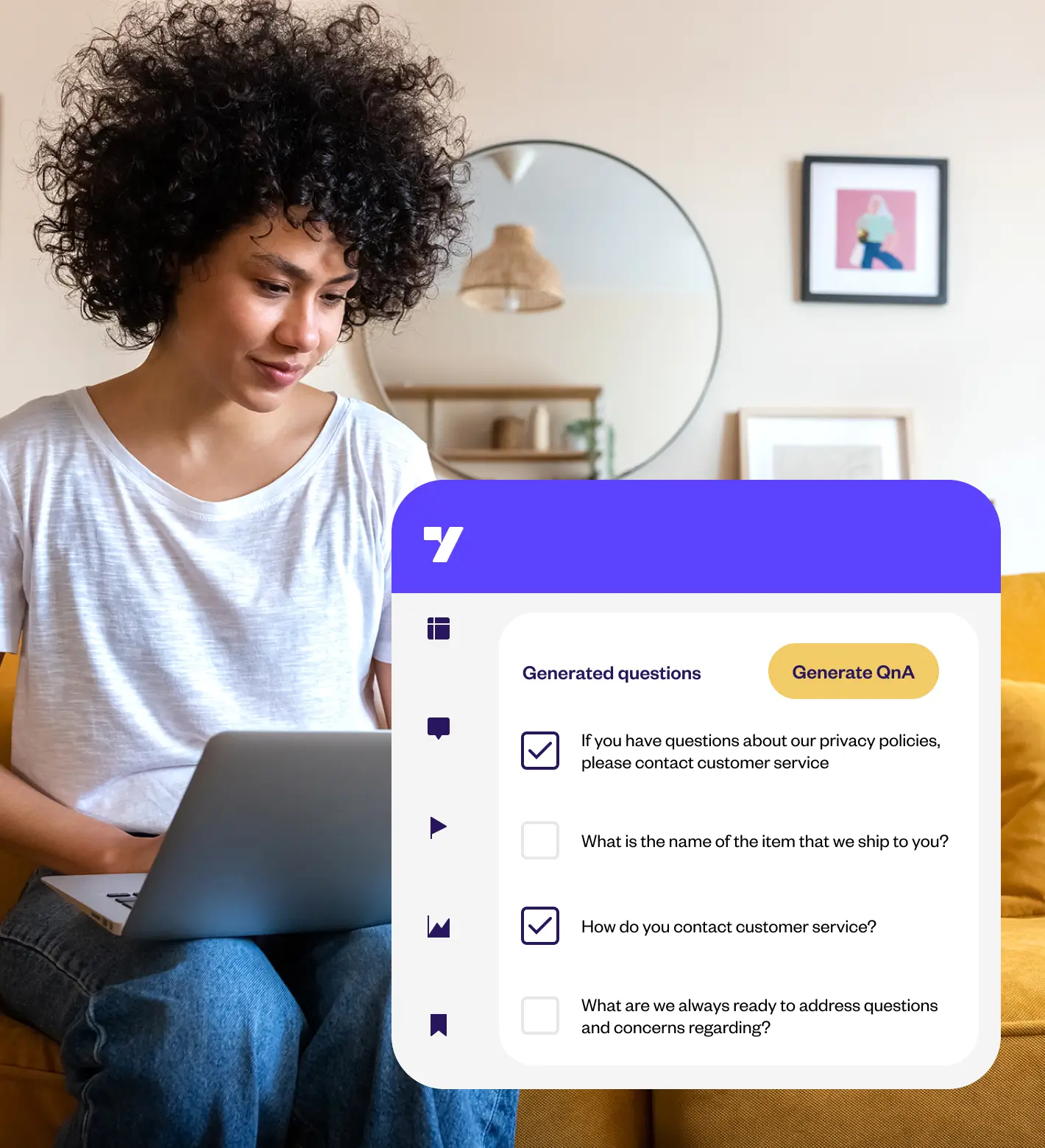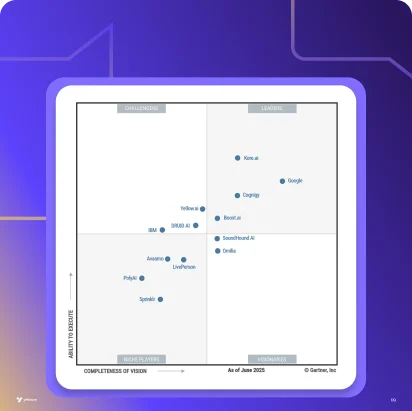Key Takeaways
- Customer service automation has become essential for handling growing customer demands across every channel and time zone.
- It helps enterprises cut costs, speed up response times, and maintain consistent customer support quality at scale.
- Automation frees human agents to focus on complex issues while improving overall customer satisfaction and customer loyalty.
- When implemented with the right tools and training, it becomes a long-term driver of efficiency, growth, and customer trust.
In a rush and need the TL/DR version?
Summarize
Customer service automation streamlines operations, enhances efficiency and ensures consistency across interactions using AI and integrated systems. It’s crucial for providing quick, personalized service and improving customer satisfaction.
How to automate customer service
- Deploy AI Agents: AI agents respond quickly to customer inquiries, reducing the need for human intervention and speeding up service.
- Integrate CRM systems: Seamless integration of CRM systems enhances customer interaction tracking and management for better service delivery.
- Use predictive analytics: Predictive analytics anticipate customer issues before they escalate, enabling proactive service solutions.
- Implement self-service options: Providing customers with self-service tools empowers them to find solutions instantly, increasing satisfaction.
- Adopt omnichannel support: Uniform customer service across multiple channels ensures a consistent and reliable customer experience.
- Analyze customer interactions: Detailed analysis of customer interactions helps identify trends and areas for improvement, enhancing service quality.
- Personalize customer experiences: Utilizing customer data to tailor interactions improves engagement and fosters loyalty.
The potential of customer service automation is transformative and its future is automated, intelligent, and more human-centric than ever.
Note: This summary is not a substitute for reading the article in full, as you may miss out on important nuances.
Customer service automation is revolutionizing how businesses engage with their customers. Companies can use cutting-edge technologies like agents and AI-driven processes to enhance user experiences, ensure consistent service delivery, and streamline operations. In today’s competitive market, understanding and implementing effective automated customer service is crucial for growth and customer loyalty. This guide offers insights into the advantages and practicalities of automated customer service, highlighting its relevance for businesses of all sizes.
Can businesses afford to keep their customers waiting in a digital age where speed is king? The answer is a resounding “no.” An impressive 90% of today’s discerning consumers favor the immediacy of agents and virtual agents. It’s not a fleeting trend; it’s the new standard. Whether you’re steering a fledgling startup or overseeing a multinational giant, customer service automation is no longer optional—it’s essential. And it’s not just about rapid responses; it’s about curating experiences that linger, that resonate. Reflect on this: 80% of progressive enterprises have already harnessed or are strategizing to embrace automation in their customer service blueprint.
Yet, amidst this transformative journey, a word of caution is due. A revealing report from Accenture highlighted that 61% of clients waved goodbye after one unsatisfactory encounter with a brand. Automation’s brilliance isn’t just in mitigating such pitfalls but in consistently elevating the customer’s voice, turning feedback into actionable insights. But a word to the wise: automation is akin to wielding a double-edged sword. Its true potential is unlocked only when it’s built on a foundation of meticulous planning, adept tools, and a splash of innovation.
Related must read:
- Customer Service Metrics That Matter in 2025
- How to Improve Customer Service in 2025: What’s Changed, What Still Works, Where Should You Focus
What is customer service automation?
Customer support automation offers an innovative take on handling customer interactions by utilizing cutting-edge technologies like AI Agents, machine learning, and integrated software systems. It’s a shift from the traditional, human-centric model to a more efficient, technology-driven method.
At its core, customer support automation involves the use of intelligent systems to handle customer queries, execute repetitive tasks, and streamline the overall support process. It means that routine inquiries like order status updates, basic troubleshooting, or frequently asked questions can be handled by automated systems. These systems are designed to provide quick, accurate responses, enhancing customer experience while freeing human agents to focus on more complex problems that mandate a personal touch.
Automation in customer support goes beyond answering queries. It extends to integrating an organization’s technology stack – connecting databases, CRM systems, help desks, and other mission-critical applications. This integration breaks down data silos, making information readily accessible and ensuring a more cohesive, informed support experience. In essence, customer support automation transforms how businesses engage with their customers, making the process faster, more accurate, and more satisfying for both parties involved.
Among the various solutions under this umbrella, some stand out:
- AI agents: These aren’t just digital interfaces; they’re conversational allies. They can parse user queries, provide solutions, or even escalate issues when needed.
- Knowledge bases for FAQ: Consider them the first line of defense, addressing common queries and concerns and providing instant clarity.
- Intelligent routing: It ensures that if a human touch is needed, the customer connects with the most suitable agent, saving time and frustration.
- Predictive analytics: Uses historical data to predict future customer inquiries, enabling preemptive solutions and tailored support recommendations.
- Customer surveys: Automated post-interaction feedback mechanisms that gauge satisfaction levels and gather insights.
- Ticket automation: Streamlining issue reporting, tracking, and resolution to ensure nothing falls through the cracks.
Imagine this: A traveler needs to modify their hotel reservation dates. Instead of navigating through multiple web pages or waiting on a call, they converse with an AI agent. The AI agents swiftly retrieves the booking details, checks for availability on the new dates, and even informs about any rate differences. Within minutes, the reservation is updated, and the traveler receives a confirmation. That’s the prowess of customer service automation in the travel industry – streamlining adjustments and providing instant, hassle-free solutions.
A user faces an issue with a software they’ve just purchased. Instead of grappling with long wait times on a call, they interact with an AI agent. This AI agent recognizes their concern and offers real-time troubleshooting solutions. If the problem persists, the agent schedules a call with a specialized agent, fully briefed about the issue, ensuring the user doesn’t have to explain everything all over again. That’s the prowess of customer service automation – ensuring quality, consistency, and efficiency in every interaction.
How Yellow.ai Helped Randstad in Exceeding Expectations With Customer Support Automation
The 7 benefits of customer service automation
One must recognize the importance of customer support automation in business. Taking such an approach to customer service goes beyond convenience. It is a well-thought-out strategic need potent enough to influence a company’s success significantly. Let’s explore why automating customer support is advantageous and essential for modern businesses.
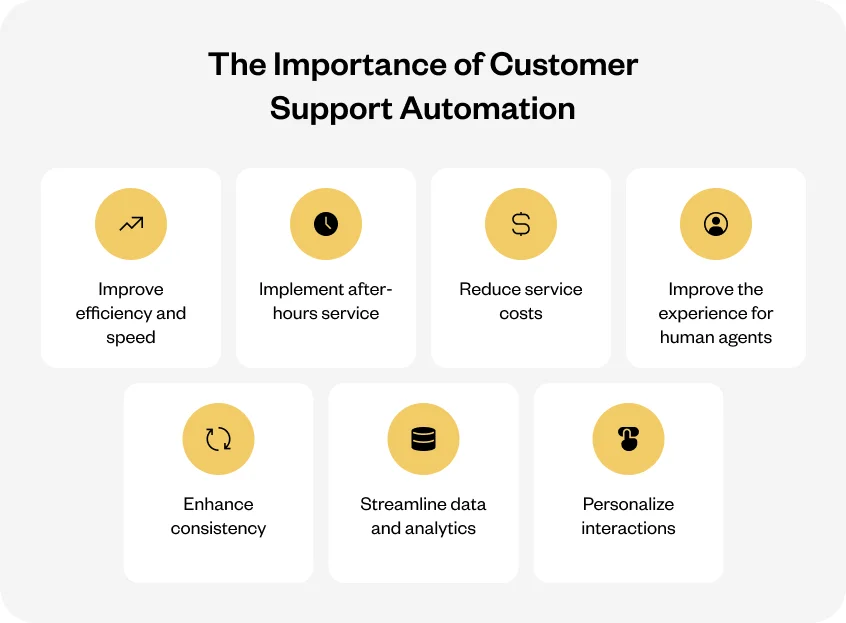
Firstly, customer support automation greatly enhances efficiency. Companies can significantly reduce response times by handling routine inquiries and tasks through AI-driven systems. This speed and efficiency are crucial in an environment where, according to a report by Gartner, customers who experience prompt issue resolution are almost twice as likely to repurchase. Automated systems ensure that customers receive instant support, elevating their overall experience with the brand.
Moreover, automation frees human agents to focus on complex, nuanced customer issues requiring empathy and strategic thinking. Besides improving support quality for complicated queries, it also increases job satisfaction among support staff as they engage in more meaningful and challenging work.
The current customer landscape also demands omnipresence. With consumers interacting with brands across various platforms, automation enables businesses to offer consistent and high-quality support across all channels. This omnichannel approach is critical, considering that one-third of consumers might consider switching companies after just one instance of poor service.
Customer support automation is more than just handling inquiries. It’s about creating a comprehensive, personalized customer experience. AI-powered tools can tailor interactions based on individual customer preferences and history, offering a level of personalization that can significantly boost customer loyalty.
Finally, automation in customer support is a key driver for scalability. Customer inquiries might skyrocket as a business expands. Automation allows for efficiently scaling customer support operations without a corresponding increase in costs or resources.
Having recognized the essence of customer service automation, let’s explore the numerous benefits it brings to the table. From improving response times to enhancing overall customer experience, businesses can harness the power of automation to propel their customer service initiatives to new heights. And with platforms like Yellow.ai offering many features, businesses can fully realize these benefits.
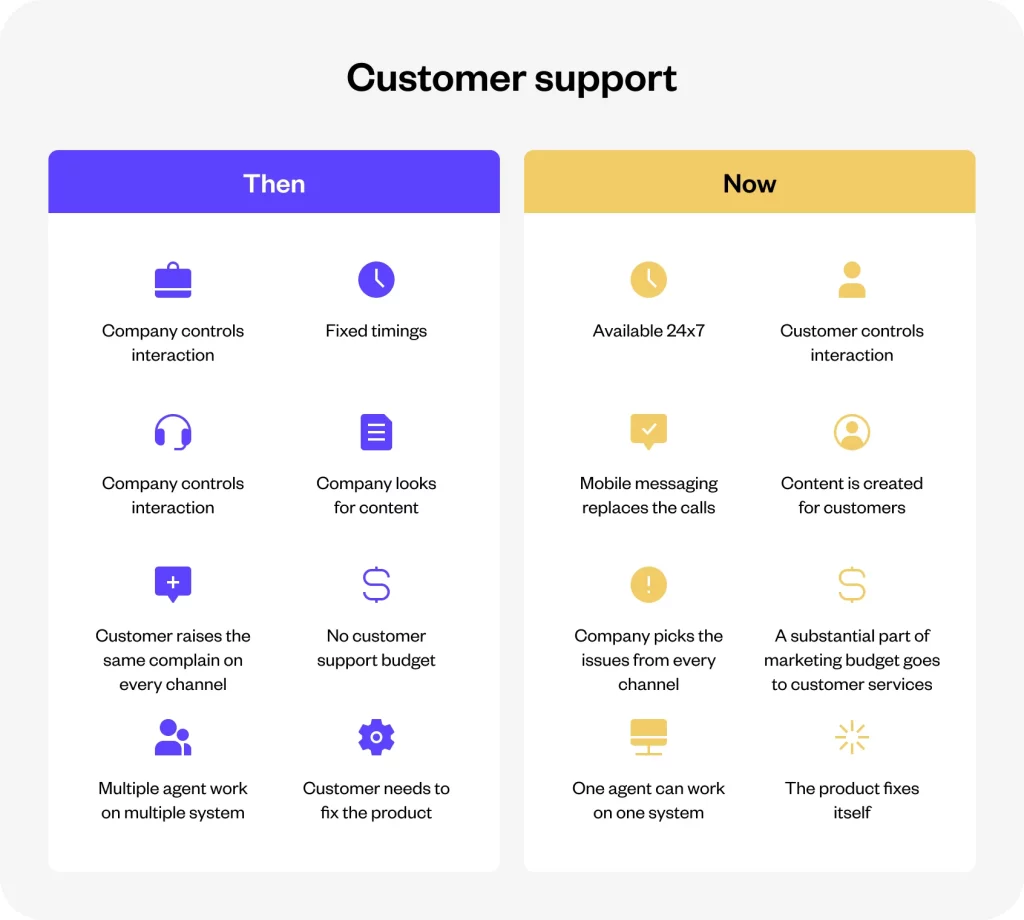
1. Improve efficiency and speed
A delay of a few minutes can be the difference between retaining a customer and losing one. Automated systems, using platforms like Yellow.ai, prioritize rapid responses. With algorithms designed to address and resolve queries swiftly, brands can assure their customers that they’re always a priority. For our tech-forward customers, especially Millennials and Gen-Z, such immediacy is a non-negotiable expectation.
2. Implement after-hours service
The global nature of online business means customers from different time zones will seek assistance. While human agents operate in shifts, automated tools, like AI agents, are tireless. They offer real-time solutions 24/7, ensuring that a customer’s geographical location or query time doesn’t impede their experience.
3. Reduce service costs
Efficient allocation of resources is crucial for any business’s bottom line. As McKinsey suggests, automation can lead to a substantial cost reduction. How? By multitasking—handling multiple queries simultaneously, minimizing errors, and decreasing the need for a large support staff. The long-term financial benefits are undeniable: reduced operational costs, fewer errors leading to customer churn, and optimal resource utilization.
4. Improve the experience for human agents
Automation isn’t just about customers; it’s about empowering agents, too. By automating mundane tasks, agents can focus on more complex and value-added activities. As stats suggest, a well-implemented automation system can free up to 30% of an agent’s time, fostering productivity and job satisfaction.
Related read: AI Agents: Types, Benefits and Examples
5. Enhance consistency
Consistency is the bedrock of brand trust. Automation tools, especially when tailored using platforms like Yellow.ai, can be programmed to ensure that every interaction—be it a chat response or an email—echoes the brand’s voice, values, and promises. This uniformity ensures that customers always know what to expect, fostering trust and reliability.
6. Streamline data and analytics
With every interaction, a huge chunk of data is generated. Platforms equipped with AI capabilities, like Yellow.ai, excel in sifting through these vast data sets. They categorize feedback, gauge sentiment, and offer insights that can be pivotal for business strategies. Coupled with seamless integration with CRMs, automation tools centralize data, enabling businesses to monitor KPIs and uphold service-level agreements effortlessly.
This continuous feedback loop allows businesses to iterate and improve their services dynamically.
7. Personalize interactions
The modern customer doesn’t want generic interactions; they crave personalization. Automation tools can amass and analyze data about a customer’s preferences, past interactions, and purchase history. When integrated seamlessly, this data-driven approach can craft experiences that resonate on a personal level, making each customer feel valued and unique.
The impact of automation on enterprise customer service
Businesses are constantly evolving, and enterprises are at the epicenter of growth, innovation, and increasing consumer expectations. Effective service delivery becomes paramount with surges in customer interaction as a company scales. Customer service automation is emerging as the silent force multiplier for businesses striving for efficiency and excellence.
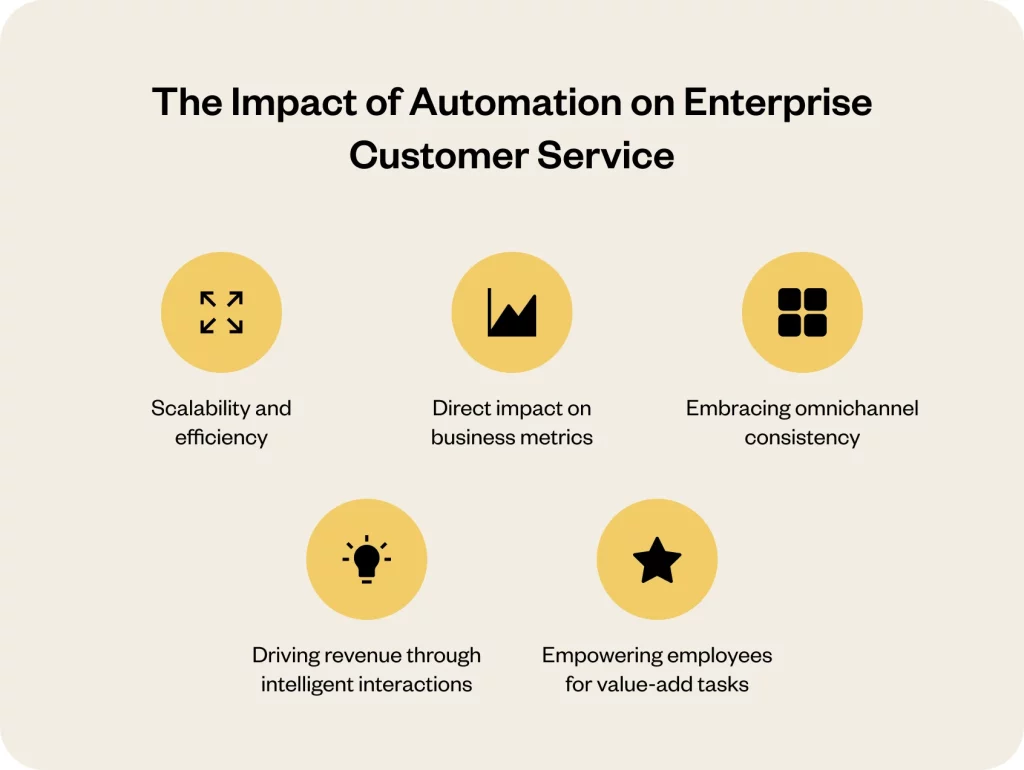
1. Scalability and efficiency
Imagine an enterprise’s dilemma where daily inquiries run into hundreds or even thousands. Traditional support mechanisms can be overwhelmed, leading to slower response times and potential dissatisfaction. However, with platforms like Yellow.ai, AI agents swiftly address most of these inquiries. Besides enhancing CX, this speed ensures that the support staff focuses on more intricate, non-repetitive issues, driving efficiency in resource allocation.
Related read: 10 Key customer experience (CX) trends in 2023 and beyond
2. Direct impact on business metrics
Speedy and efficient responses lead to a noticeable uptick in customer loyalty. Happy customers aren’t just return customers; they’re also brand ambassadors. Their loyalty can be quantified through higher sales, repeat business, and positive word-of-mouth marketing. When consumers perceive a brand as responsive, their long-term association leads to consistent revenue streams, thus positively impacting the ROI.
3. Embracing omnichannel consistency
Today’s consumer is omnichannel, hopping from one platform to another. With automation, enterprises can ensure consistent support across various channels—be it chat, email, or social media. Yellow.ai, for instance, enables seamless integration of all support channels, ensuring that a customer’s history and preferences are consistently available, eliminating the redundancy of repeated information gathering.
4. Driving revenue through intelligent interactions
Automation tools possess the ability to discern potential sales opportunities. For example, if an AI agent identifies a high purchase intent based on a customer’s queries, it can proactively display relevant product details or reviews. Furthermore, automated reminders about special offers or free shipping thresholds can encourage increased cart value. And when the situation demands, human agents, briefed with all the necessary insights, can step in to seal the deal.
5. Empowering employees for value-add tasks
Beyond the tangible benefits to the bottom line, there’s a significant positive impact on the workforce. Automation liberates employees from the drudgery of routine inquiries. This newfound freedom allows them to engage in more fulfilling tasks, deepening customer relationships and honing their skills. Consequently, job satisfaction improves, leading to better retention and a more motivated team.
How to automate customer support?
In an era dominated by instantaneous reactions and real-time feedback, businesses must adapt rapidly to meet and exceed customer expectations. As we pivot into the age of smart automation, the onus is on businesses to harness the power of technology without sacrificing the human touch. It means walking a tightrope between convenience and connection. So, how do we strike this balance? Let’s delve deeper.
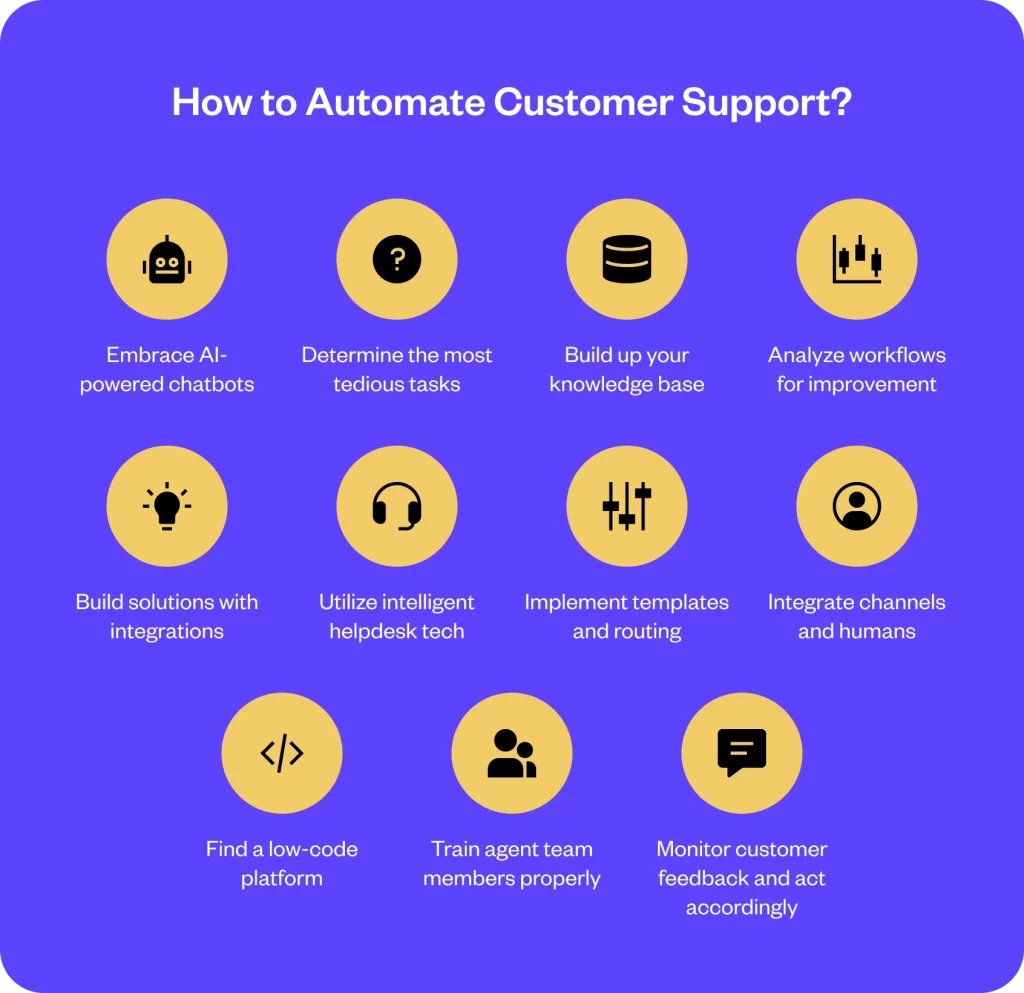
1. Embrace AI agents
AI agents represent a revolutionary step in customer support. These AI agents, equipped with advanced algorithms, do not just respond to queries but learn from each interaction. They can identify common questions, analyze customer interactions, and provide efficient support. As these AI agents are available 24/7, they ensure that customers receive immediate assistance, streamlining their experience with your brand.
Moreover, these AI agents can personalize interactions based on customer history, making support more effective and delightful. Their ability to handle a large volume of queries simultaneously significantly reduces the load on human support teams, letting them focus on more complex customer needs.

Related must-reads:
- The Best AI Chatbots in 2024
- Customer service chatbots: Benefits and examples [2024]
- AI chatbots for customer engagement
- 9 Real life chatbot examples [well-known brands]
2. Determine the most tedious tasks
Identifying and automating the most time-consuming tasks in customer support can immensely boost efficiency. When automated, tasks like data entry, scheduling, and basic customer queries can free up valuable time for your team to focus on building better customer relationships.
Deliver unmatched omnichannel experience from one platform

3. Build up your knowledge base
A robust knowledge base is like a well-stocked library – it educates, empowers, and enlightens. Creating a comprehensive repository of FAQs, guides, and tutorials gives your customers the tools to help themselves. As the data suggests, consumers appreciate this empowerment.
While the figures tout the importance of self-service, it’s crucial to keep this resource updated. Intersperse textual content with videos for a richer experience, and remember, periodic audits can ensure that your knowledge base remains relevant and accurate.
4. Analyze workflows for improvement
Careful analysis of your existing customer support workflows can reveal several avenues for automation. By digitizing and automating various elements of the customer support process, businesses can ensure that support teams have the required tools at their disposal, enabling them to provide quicker and more effective service.
Related read: AI automated workflows for customer support agents
5. Build solutions with integrations
Integrating your customer support automation with widely used apps and systems can drastically improve the efficiency and effectiveness of your support operations. These integrations automate repetitive tasks, enable easy access to information, and ensure a uniform customer experience across all channels.
6. Utilize intelligent helpdesk tech
With features like AI-driven ticketing and routing, intelligent helpdesk technology can transform how businesses handle customer inquiries. By automating these processes, intelligent helpdesks can drastically minimize response times and enhance the accuracy of information provided.
Related read: Help desk ticketing system: Best practices for businesses
7. Implement templates and routing
Consistency is the name of the game. Employing customer service templates ensures that each interaction echoes your brand’s ethos, voice, and values. Templates expedite response times without compromising on quality.
Parallelly, intelligent routing, whether through CRM or AI agents, ensures that each query reaches its rightful destination, minimizing frustration and maximizing resolution speed.
8. Integrate channels and humans
While AI agents and automation tools handle many inquiries, there’s an irreplaceable value to the human touch. Depending on the complexity or sensitivity of the issue, customers might lean towards human agents.
Integrating automated tools with human agents ensures that customers always get the best of both worlds. It’s not about replacing but enhancing – using technology to complement human expertise.
9. Find a low-code platform
Embracing a low-code platform for customer support automation allows businesses to customize and deploy solutions quickly and with minimal technical expertise. These platforms offer drag-and-drop interfaces, making it easier to create automated customer support workflows that cater to your specific business needs.
10. Train agent team members properly
Effective implementation of customer support automation also depends on training your team adequately. Ensure your team members understand how to use the automated systems and are comfortable with the technology.
Training must include the technical aspects of automation tools and best practices to interact with customers via these systems. Equip your team with the required knowledge and skills to get the maximum benefits of automation technology.
Related read: AI agents: types, benefits, and examples
11. Monitor customer feedback and act accordingly
Regularly monitoring customer feedback is crucial to refining your automated service system. Collect feedback through surveys, social media, and direct customer interactions. Analyze such feedback to identify areas for improvement and make necessary adjustments to your automation strategy.
Ready to transform your customer service experience with automation? Let Yellow.ai’s dynamic platform empower you with an AI Agent solution that streamlines and enhances customer interactions effortlessly. Discover how Yellow.ai can be your perfect companion in the customer service automation journey. Book a demo and experience the magic unfold.
6 Examples of automated customer service in action
Let’s explore some real-world examples of automated customer service and understand how they enhance business operations and customer experiences.
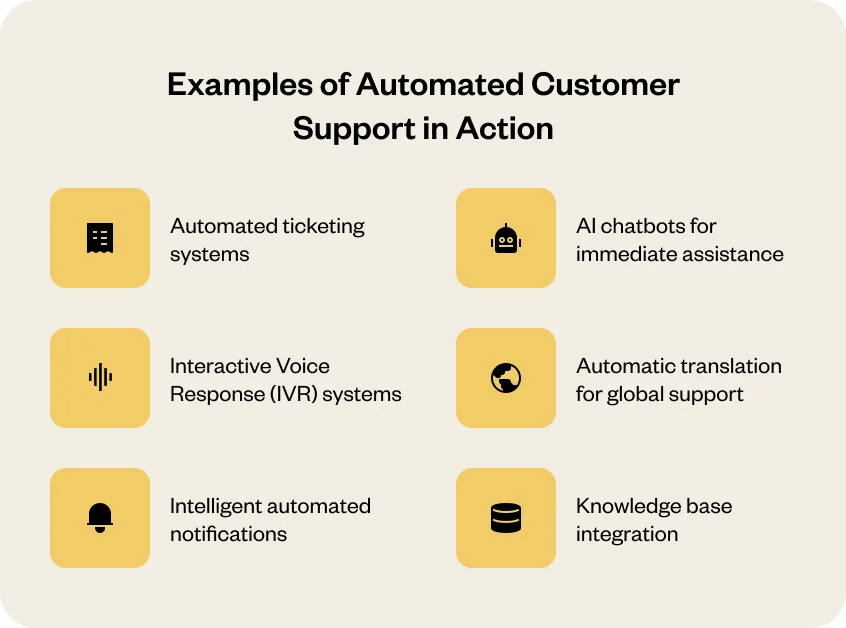
1. Automated ticketing systems
One of the most common forms of automated support is automated ticketing systems. In this setup, customer queries are automatically classified and routed to the appropriate support agent or department. This system ensures that each query is handled by the most qualified person, reducing response times and increasing the solutions’ accuracy.
For instance, an e-commerce platform might use an automated ticketing system to categorize queries related to orders, returns, and product inquiries, ensuring efficient and specialized handling.
Related read: Best practices for support ticket systems
2. AI agents for immediate assistance
AI agents are a prominent feature in modern customer support. These bots are programmed to handle a range of common customer inquiries, from providing product information to resolving basic issues. By being available 24/7, AI agents offer immediate assistance, enhancing customer satisfaction.
For example, a telecommunications company might deploy an AI agent on its website to help customers with plan upgrades, billing queries, or troubleshooting steps for connectivity issues.
3. Interactive Voice Response (IVR) systems
IVR systems are used to manage incoming calls effectively. They guide callers through a series of pre-recorded messages and menu options, ensuring that they are directed to the correct department or provided with the needed information.
IVRs are particularly useful for businesses with high call volumes, such as customer care centers for utilities or banking services, where they can efficiently handle routine inquiries like account balances or service disruptions.
4. Automatic translation for global support
Automated translation in customer support is invaluable for businesses operating on a global scale. This technology enables support teams to communicate with customers in various languages, breaking down linguistic barriers.
For instance, a global software company can use automated translation to assist users from different parts of the world, ensuring that language doesn’t hinder the quality of support provided.
5. Intelligent automated notifications
Automated notifications keep both customers and support agents informed. These can include reminders for customers about appointments or updates on their queries. Similarly, they can notify agents about pending tasks or tickets that require attention.
An online service provider, for example, might use automated notifications to inform customers about scheduled maintenance or service outages.
6. Knowledge base integration
Automated support also includes integrating a dynamic knowledge base. Customers can access a wealth of information, tutorials, and FAQs, facilitating them to resolve their issues independently.
A software company, for example, can have an incredible online knowledge base where users can find detailed guides and troubleshooting tips.
Success stories

Hyundai boosts revenue and improves customer service with AI automation
Explore how Yellow.ai’s automation led to ~1000 car sales, a 10% retail conversion rate, and over 1.4 million user impressions

Pelago reimagines customer experience with generative AI powered conversational AI agents
Within a mere six weeks of going live, Pelago not only onboarded over 5,000 users but also achieved a striking 50% deflection rate!
How Yellow.ai helps with automating customer service
Yellow.ai stands out as a leading player, providing enhanced customer support, and offering innovative solutions that revolutionize how businesses interact with their customers. Here’s how Yellow.ai is reshaping the world of automated customer support, making it more efficient, responsive, and personalized.
1. Advanced AI agents
Yellow.ai’s flagship feature is our advanced AI agents. These agents are programmed to respond to queries and are equipped with deep learning capabilities, allowing them to understand customer intent and provide contextual responses. You can use our voice AI agents, which interact in over 135 global languages, catering to customers from multilingual backgrounds. For businesses, this means having a virtual assistant that can handle a wide array of customer queries around the clock, ensuring no customer is left waiting.
2. Automating tedious tasks
Yellow.ai excels in identifying and automating the more tedious aspects of customer support. By automating routine tasks like ticket generation, order status updates, and FAQ responses, our platform allows human agents to focus on complex queries that require a human touch. It streamlines operations and significantly reduces the chance of burnout among customer support staff, enhancing their efficiency and job satisfaction. Consider using our dynamic automation platform (DAP) to experience its efficacy.
3. Seamless workflow integration
One of the key strengths of Yellow.ai is our ability to integrate with existing business workflows and systems. This integration is vital for creating a unified customer support ecosystem where information flows seamlessly between different departments and applications. Whether it’s a CRM system, an order management platform, or a helpdesk tool, our platform can connect and synergize with these systems, breaking down data silos and enhancing overall efficiency.
4. Personalization at scale
With Yellow.ai, you can take personalization in customer support to a new level. Take, for example, our conversational service cloud, which can give tailored CSE. Our platform’s AI-driven analytics and machine learning algorithms can analyze customer data and interaction history, enabling businesses to offer personalized support and recommendations. This capability ensures that each customer feels valued and understood, significantly enhancing their experience and loyalty.
5. Scalable customer support solutions
As businesses grow, so do their customer support needs. Yellow.ai’s platform is designed for scalability, enabling your businesses to expand their customer support capabilities without a proportional increase in resources or costs. This scalability ensures that your businesses can maintain high-quality customer service even as you expand your customer base.
6. Feedback monitoring and actionable insights
Finally, Yellow.ai provides robust tools for monitoring customer feedback and generating actionable insights. Our platform can analyze customer interactions, survey responses, and feedback, giving you a clear understanding of your business’s performance and areas for improvement. This data-driven approach is crucial for continuously refining customer service strategies and maintaining high satisfaction levels.
Yellow.ai offers a comprehensive, customizable, and scalable solution for automating customer support. Our blend of advanced AI, seamless integrations, personalized interactions, and actionable insights make us an indispensable tool for businesses striving to enhance their customer support in the digital age.
Empower your customers with a support experience like no other

Final thoughts
Automated customer support is beyond just a technology replacing human effort. Consider it as a technological boon augmenting human capabilities. We’ve ventured through various facets of Customer Support Automation (CSA), from AI agents to seamless workflow integrations. In the process, we have realized that automation is not a replacement but an enhancement. It’s about creating an ecosystem where technology and human expertise merge, ensuring that customer support is a function and a significant driver of customer satisfaction and business growth. The future of customer support is here, and it’s automated, intelligent, and more human-centric than ever.
FAQs – Customer service automation
What is customer support automation (CSA)?
Customer Support Automation (CSA) is a technology-driven approach to managing customer interactions and support tasks. It harnesses AI, ML, and integrated software systems to handle routine inquiries, provide immediate responses, and streamline the support process. CSA enhances efficiency, ensures quick and accurate support, and frees human agents for complex tasks.
What are the benefits of implementing customer support automation?
The benefits of Customer Support Automation include enhanced efficiency with reduced response times, improved customer satisfaction through immediate and accurate support, and more personalized customer experience. Additionally, it allows for scalability in support operations and unburdens human agents to focus on complex, value-added interactions.
What are some examples of customer service automation?
Automated customer service covers tools like live chat, AI Agents, and voice-enabled virtual assistants. Additionally, there are automated ticketing systems directing queries to the appropriate agent or department, standardized email responses for common queries, and self-service portals allowing customers to find solutions independently.
What are some common use cases for customer support automation?
Common use cases for CSA include automated ticketing systems for efficient query routing, AI agents for immediate customer assistance, IVR systems for effective call management, automatic translation for global support, intelligent automated notifications, and knowledge base integration for self-service options.
How does automated customer service work?
Automated customer service uses technology to capture customer input, processes this through an AI-driven system to determine the best response or action, and then executes the appropriate response. Continuous data analysis helps refine and improve the system’s responses over time.
How does an AI agent work in customer support automation?
In CSA, an AI agent uses AI and ML to comprehend and respond to customer queries. It processes customer requests, provides relevant information or solutions, and learns from interactions to improve future responses. AI agents offer 24/7 support, handling a high volume of routine queries efficiently.
What customer service tasks should be automated?
Routine and repetitive tasks, like addressing frequently asked questions, routing tickets to the right department, and providing pre-written responses for standard queries, can be efficiently automated. While these tools handle many interactions, nuanced or sensitive concerns often still need a human touch.
What are some cons of support automation?
Automation can sometimes miss the personal connection that many customers value. Despite their advanced capabilities, automated systems can occasionally misunderstand user intentions. Relying too heavily on automation can lead to service gaps where unique customer issues aren’t addressed.
Why does automated customer service matter to customer service?
It improves efficiency, offering rapid solutions to routine queries and reducing wait times. Customers benefit from immediate answers and self-service options, leading to quicker resolutions. For businesses, automation provides significant scalability without proportionally increasing the demand on human staff.
What are some best practices to automate customer support?
Even with automation, always provide an option for customers to connect with a human representative. Regularly gather feedback to refine and optimize the system. Periodic audits of automated processes ensure the system remains current and addresses evolving customer needs.
Can customer support automation replace human agents entirely?
No, Customer Support Automation is not designed to replace human agents entirely. Instead, it complements human efforts by handling routine tasks and inquiries, allowing human agents to concentrate on tricky problems demanding empathy, judgment, and nuanced understanding.
How can I start implementing customer support automation in my business?
To start with CSA, assess your customer support needs and identify tasks suitable for automation. Choose the right CSA tools and platforms, such as AI agents and low-code automation platforms, and integrate them with your existing systems. Train your team and monitor feedback for continuous improvement.
What are the potential challenges of customer support automation?
Potential challenges include ensuring the technology aligns with business needs, training staff to work with new systems, and balancing automation and human touch. Meanwhile, continuously updating the system to adapt to changing customer needs and technological advancements can be another challenge.
How can customer support automation contribute to a better customer experience?
customer service automation contributes to a better customer experience by providing quick, accurate, and 24/7 support. It offers personalized interactions based on customer data, reduces wait times, and enables customers to get support through their preferred channels, enhancing overall satisfaction and loyalty

















